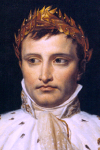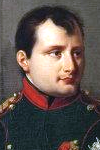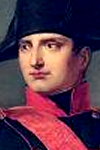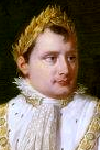
Year 1808 saw Napoleon reorganizing teaching, for which the University held the monopoly (September 17th), appointing Jean-Pierre Louis de Fontanes as its grandmaster. Moreover, the regime turned increasingly back to its roots: the decree of March 1st introduced a new hereditary nobility in France; on the 24th, the judiciary was "cleansed" of elements from the Revolution; on October 22nd, a decree replaced the words "French Empire" for "French Republic" on coins. The need for soldiers kept growing: On September 8th, the Senate approved an extraordinary levy of 160,000 troops, which included the conscription of classes from 1807 to 1809 and that of 1810, called in advance.
Another pillar of the imperial regime that risked crumbling: religious peace. In early 1808, the conflict with the Holy See entered an acute phase. On February 2nd, General Sextius Alexandre François de Miollis, in pursuance of his orders, entered Rome with his troops. Soon, several provinces were detached from the Papal States to be united to Italy. Pius VII responded by excommunicating Napoleon (March 27th) and two months later, by prohibiting French bishops to obey their government.
However, everything seemed to be fine with the Russian ally. Although they were unable to agree on sharing the spoils of a Turkish empire that they were planning to break up for their benefit, Napoleon and Tsar Alexander I met in Erfurt at the end of September to sign an agreement renewing their alliance. They separated two weeks later with touching demonstrations of friendship. The only downside: Talleyrand took such opportunity to warn the Tsar against the "madness" of Napoleon.
However, 1808 was mainly dominated by the affairs in Spain. Earlier that year, Napoleon continued to bring troops into the Peninsula while the political situation became increasingly unstable. On March 18th, the Spanish people, led by Crown Prince Ferdinand, rose against a proposed departure for America of the royal family. The next day, King Charles IV abdicated in favor of his son, and the Prime Minister Manuel Godoy was overthrown. Refusing to recognize the fact, Napoleon left for Bayonne, Basque Country, to meet the Spanish royal family. On May 5th, Charles IV put his crown at Napoleon's disposal, a decision ratified by Ferdinand and his brothers on the 10th. Now, even if the princes were trembling before the Emperor and submitting, the people adopted an opposing stance. On March 29th, a junta was established in Seville, self-called the people in arms, against the French. On the 2nd, Madrid revolted as well. Despite the harshness of the crackdown, their example was spreading. Many cities were the scene of anti-French uprisings in the last days of May and first of June. The imperial troops intervened with varying degrees of success and endured on July 22nd their biggest defeat: at Bailen, General Pierre Dupont de l'Etang capitulated with 20,000 soldiers. Joseph Bonaparte, the new King of Spain appointed by Napoleon, had been in Madrid for two days. A week later, he must flee his capital. On August 5th, in view of the gravity of the situation, Napoleon sent to Spain half of the French forces in Germany, which took however several weeks to arrive and must face not only the Spanish insurgents but also the British troops released by the French defeats in Portugal.
Indeed the British, having gained a foothold in the Iberian Peninsula on July 8th, 1808 to defeat Jean-Andoche Junot at Vimiero on August 21st, and having received from him on the 30th the capitulation of Cintra, entered Spain on October 15. The situation they found was by no means a bed of roses. The French were again on the offensive and accumulated victories, galvanized by the presence of the Emperor, who had joined them in early November. Cautiously, the British army retreated to Portugal. After the French victory of Somosierra on November 30th, Madrid's only option was to capitulate. Napoleon staged his clemency and announced a package of revolutionary measures, which he believed, would put the people at ease: abolition of feudal rights, customs, and provincial tribunal of the Inquisition. However, he also introduced a policy of requisitions to finance the war.
On December 11th, 1808, the English entered Spain again and the Emperor decided to personally take the lead against them. He desisted however upon receiving a dispatch from Cambacérès with news on the Austrian armies. He gave up his pursuit of the British army on January 3rd, 1809 and returned to Paris, leaving to Marshal Jean-de-Dieu Soult the task to pursue hostilities against the English in the peninsula, with mixed results.

On April 8th, 1809, Napoleon saw the Austrians, supported financially by the British, trespass the limits of Bavaria, an allied state of France. On the 10th the Archduke Johann von Habsburg entered Italy. The Emperor headed his army and defeated the Austrians at Tengen, Abensberg, Eckmühl, Regensburg, and Gora. Less than a month later, the Eagle was in Schoenbrunn (May 12th). On the 13th, Vienna capitulated. A few days later, Napoleon made a first attempt to stand on the left bank of the Danube where the Archduke Charles of Austria was attended by his troops (Battle of Aspern-Essling, 20-22 May). It proved a failure, which caused considerable losses and the death of Marshal Jean Lannes. A month later, on 5 and 6 July, almost on the same ground, Napoleon, who had received the backing of the Italian army led by Prince Eugène de Beauharnais and Etienne Macdonald, inflicted on the Austrian army the Wagram defeat. On the 11th, a new French victory at Znaim, decided the Emperor of Austria Francis I to seek an armistice, signed the next day. On October 14th, the Treaty of Vienna ended the campaign.
That campaign had nevertheless highlighted a revival of German nationalism, whose serious consequences were still to come. This was reflected, among other things, in the attempts to assassinate the Emperor on May 23th in Regensburg and on October 13th in Vienna, the latter carried out by Friedrich Staps. Staps was executed on 17th, despite the efforts of Napoleon to let him live.
For now, Napoleon was offered in November 1809 by Prince Metternich of Austria, who had become chancellor in July and wanted to pursue a policy of rapprochement with France, to marry the Archduchess Marie Louise. On 15 December, Napoleon and Josephine de Beauharnais publicly broke up their marriage. On the 16th, the marriage was dissolved by an act of the Senate. On January 9th, it was declared invalid by the Officiality of Paris, which did not improve the relations between Napoleon and the Pope.
These relations had also continued to deteriorate throughout the year. On May 17th, Napoleon annexed by decree the Papal States to the French Empire. On June 10th, the Pope made public the excommunication bull of Napoleon; on July 6th, the pontiff was arrested and taken to Savona; on August 26th, he refused to appoint the bishops, which led the Emperor to appoint on November 16th a committee of bishops to examine the conflict between the Emperor and the Pope. His uncle, Joseph Fesch, Archbishop of Paris since January 31st, chaired the committee.
Napoleon completed the year 1809 with a batch of ducal appointments (Joseph Fouché became Duke of Otranto, Régnier Duke of Massa, Champagny Duke of Cadore, Gaudin Duke of Gaeta, Clarke Duke of Feltre, Maret Duke of Bassano) and the annexation of the Illyrian provinces (December 29) whose government went to Auguste Viesse de Marmont.

At beginning of the year 1810, Napoleon devoted his time to the delicate choice of a new wife. To that end, he consulted the Privy Council, which presented several options: the future empress could be Russian, Austrian, Saxon, or even French. The first option was quickly abandoned upon refusal of Tsar Alexander to give the hand of his sister. The choice of an Austrian wife was required, and on February 7th was signed a temporary marriage contract between Napoleon and Marie Louise, which the Vienna court ratified on the 16th. On March 13th, Marie-Louise set off and the civil marriage took place on April 1st. On the next day, the religious ceremony celebrated by Cardinal Fesch became an opportunity for further escalation of the dispute between Napoleon and the Church: thirteen Italian cardinals refrained from attending, despite the risk of a conviction for serious offence to the Emperor.
Indeed, despite the efforts of the Emperor to wake in his clergy the old Gallican reflexes (set of question of 11 January of the Committee of Bishops), the authority of Pope Pius VII prevailed. Cardinal Fesch caved in in September, as he refused to hold the Archdiocese of Paris. It was up to the former migrated Jean-Siffrein Maury to hold it, just to see himself banned from performing his duties by the Pope (November 5th and December 18th), as the many grievances inflicted by Napoleon to Pius VII had increased with the annexation by the Empire of Rome on February 17th and the award of the title of King of Rome to the Prince Imperial, yet unborn.
In the year 1810, the reputation of an ogre of Napoleon was also justified by other Empire expansions. On January 14th, the Kingdom of Westphalia made it obvious by annexing Hanover. On March 16th, France nibbled the south of Holland before swallowing it whole on July 9th, after the abdication of Louis Bonaparte. On December 13th was the turn of the coastal regions of Germany. The Empire reached its maximum extension (one hundred and thirty departments), but the Tsar was unhappy that his brother-in-law lost the Duchy of Oldenburg on this occasion. This expansion, as the rest of the foreign policy of Napoleon, was mainly aimed at strengthening the continental blockade.
It was on the same grounds that he entered into an alliance with Sweden on January 6th, 1810 and drew closer to the United States of America by making decrees favoring free trade between the two countries. The decree of Trianon (August 5th), which struck the colonial commodities with exorbitant taxes was similarly inspired: to do without imports from England.
However, this imperial policy was moving towards failure. The Iberian peninsula was not submitted, the Spanish people remained deeply hostile, and the English continued to keep Portugal. At the other end of Europe, the Tsar, yielding to mysticism and its aristocracy, banned in December 1810 the entry of French goods in the Russian Empire, bringing Napoleon to write him a letter at beginning of the year 1811, stating the end of their alliance.

The relations of Napoleon and Alexander I kept deteriorating throughout 1811. Although duly forewarned of the dangers of a military campaign in Russia by Armand de Caulaincourt - back in June from his embassy in St. Petersburg - the Emperor, before the diplomatic corps gathered to celebrate his birthday on August 15th, threatened Russia with war. In December he offered Austria and Prussia to join him against the Tsar. However, in February, he had declined Bernadotte's offers, who carried a proposed alliance with Sweden, so useful in the context of the looming conflict.
Those already underway, however, only brought him mixed satisfaction.
In the Iberian Peninsula, even if Louis-Gabriel Suchet was successful in Catalonia, André Masséna failed to overcome Wellington. Napoleon replaced Masséna by Marmont, denying that the French army, harassed by elusive and increasingly bold guerillas, had lost its superiority over the Anglo-Hispano-Portuguese opponents. Yet Jean-de-Dieu Soult himself, who on evening of Austerlitz had been described as "the first boatswain of Europe", was beaten in Albuera.
In the Franco-British war, however, Napoleon believed he could score. Unfortunately, his view was distorted by an overly optimistic assessment of the economic crisis in Britain, submitted by the Minister of Finance, Martin Michel Charles Gaudin.
Finally, the Pope and the Church continued to stand up to him. In April 1811, Napoleon summoned the bishops of the Empire for a national council but dissolved it on July, as the clerics declared the Pope's consent necessary for the validity of their orders. The Emperor then took under his own authority the measures he deemed necessary. On July 27th, he regulated the appointment of bishops by imperial decree, in an attempt to reduce the Pope's powers. Pius VII accepted the new rules except in the Papal States annexed to the Empire, where he refused to appoint new bishops.
Domestically, however, the Emperor had no serious concerns. Shortly after passing the criminal code and the code of criminal procedure, he had to prevent François-René de Chateaubriand from delivering his acceptance speech at the French Academy. Indeed, the writer attacked his predecessor, the regicide Marie-Joseph Chenier, dissenting from the imperial policy that sought to suppress the memory of old quarrels. His only concern: crop failures, which led Napoleon, in August 1811 to establish a board of provisions designed to address the threats of food shortage.
On the private side, the year proved more satisfying. On March 20th, 1811 Napoleon's son was born, named Napoleon Francois Charles Joseph Bonaparte, receiving the title of King of Rome. For him the Emperor quickly began to build a palace on the hill of Chaillot (which had the upside of generating the badly-needed employment in the economic crisis). Two months later (May 22nd), the Emperor and Empress began an official visit in the western departments and returned to Paris on June 9th for the baptism of the King of Rome. A new Imperial couple's trip, this time to Holland, took place from September to November.